Is being a Police Officer your dream career option? Check out the complete step by step process on how to become a Police Officer, Eligibility, Exams, Skills Required and Salary in 2023.
Police officers are government representatives responsible for ensuring public safety, preventing crime, and maintaining law and order in society. Surprisingly, the police-public ratio in India is 152.80 per lakh person. Individuals who are passionate about serving society can pursue a career as a police officer, provided they meet the minimum requirements.
A candidate can become a constable or a police head constable after completing class 12th and clearing the state-level recruitment exams. However, to become a police officer in IPS, a bachelor’s degree is the minimum requirement and the candidate must also pass exams like UPSC CSE and SSC CPO. Moreover, age, citizenship, physical fitness, background check, and other requirements must be fulfilled.
Table of Contents
- How to Become a Police Officer in India?
- Who is a Police Officer?
- What does a Police Officer do?
- How Long does it take to become a Police Officer?
- Types of Police Officers in India
- What Skills are Needed to Become a Police Officer?
- Salary of a Police Officer
How to Become a Police Officer in India
Candidates who want to pursue the police officer career option must complete certain qualifications. Through the steps below, candidates can understand how to be a police officer.
- Step 1: Fulfill the Educational Requirements
- Step 2: Get a Bachelor’s Degree
- Step 3: Meet the Minimum Requirements
- Step 4: Appear for Competitive Exams
- Step 5: Complete Training
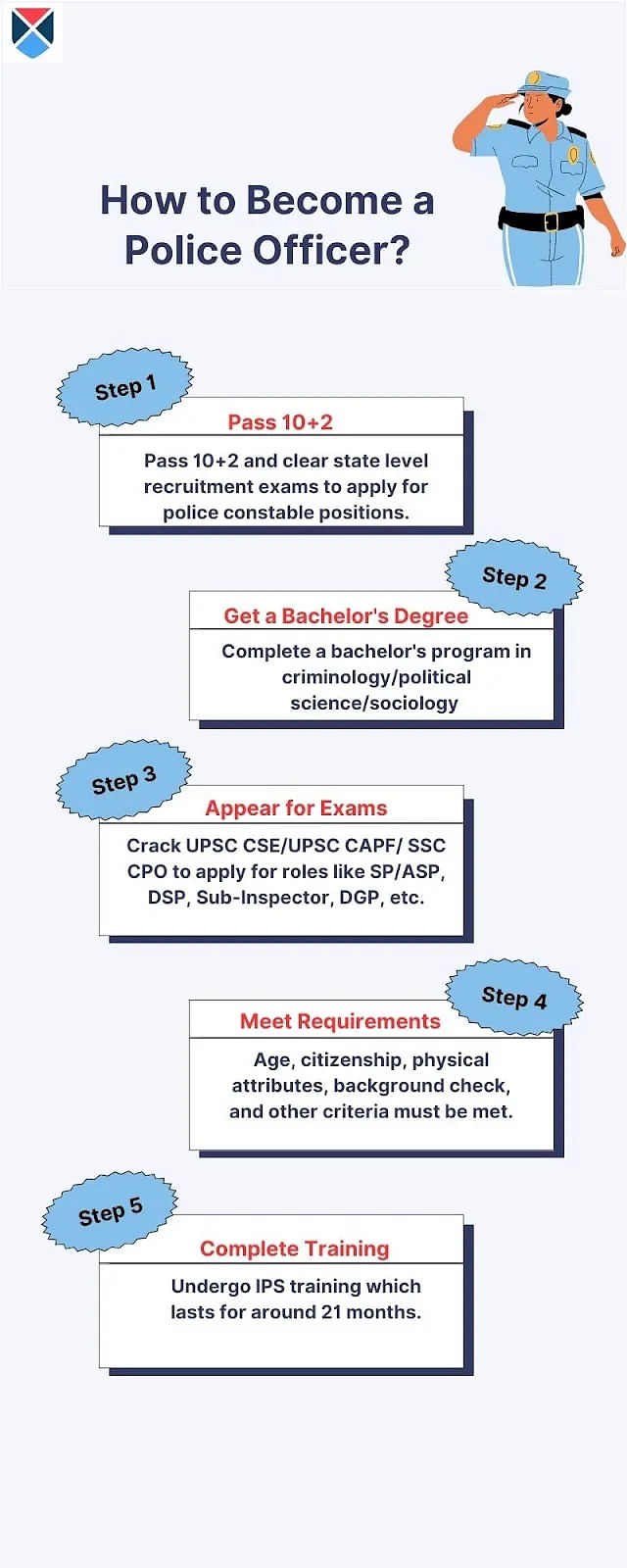
Step 1: Fulfill the Educational Requirements
A candidate who has completed class 12 can take state-level recruitment examinations to apply for police constable roles as the minimum eligibility criteria for the post is that the candidate must have completed class 12 from any recognised board. Check out the table below to know the posts available, entrance exams, and age requirements for police officers after class 12th.
|
Designation |
Entrance Exam |
Educational Qualification |
|
Constable |
State-level recruitment exams |
Successful completion of 10+2 from any recognised board or educational institution |
|
Head Constable |
State-level recruitment exams |
Succesful completion of 10+2 from any recognised board or educational institution |
Step 2: Get a Bachelor’s Degree
Aspirants can apply for higher police officer designations after completing their graduation from a recognised college with at least 45% marks. They can consider pursuing a bachelor’s degree in subjects like criminology, political science, sociology, etc.
Check out the top bachelor’s courses to become a police officer, along with other relevant details.
|
Course Name |
Duration |
Average Annual Fee (INR) |
|
3 years |
INR 10,000-1,00,000 |
|
|
3 years |
INR 5,000-1,00,000 |
|
|
3 years |
INR 7,000-1,00,000 |
|
|
3 years |
INR 5,000-80,000 |
Though it is not mandatory, aspiring police officers can also pursue master’s courses as it can provide them with better pay and promotion opportunities. One of the following master’s degree programs can be pursued by aspirants.
|
Course Name |
Duration |
Average Annual Fee (INR) |
|
MSc in Applied Criminology |
2 years |
INR 60,000 |
|
MSc in Criminology and Police Studies |
2 years |
INR 60,000 |
|
MA in Police Administration |
2 years |
INR 10,000-30,000 |
Step 3: Meet the Minimum Requirements
Besides obtaining the necessary police officer qualifications, aspirants must pass physical and mental fitness tests and clear the background check. Moreover, they should ensure they meet the age, citizenship, and other police officer requirements. The complete criteria have been provided below.
- Age: A candidate’s age should be between 21-32 years to be eligible for the general police category.
- Citizenship: Only Indian citizens can join the Indian Police Service.
- Physical Exam: Aspirants must pass Police Officer’s Physical Abilities Test (POPAT), in which they will be evaluated based on their stamina, agility, speed, focus, strength resistance, and determination. Also, they must satisfy the height, weight, and vision requirements. For male candidates, the minimum height required is 170 cm, while for female candidates, it is 157 cm.
- Mental Exam: This test is taken to figure out how well candidates can deal with stressful situations.
- Criminal Background Check: Only candidates with a clean record are eligible to join the Indian police force.
Step 4: Appear for Competitive Exams
Once candidates finish their graduation, they will become qualified to apply for higher police officer designations. However, they need to clear police officer exam like UPSC CSE or SSC exams. Here is a brief description of the various police officer recruitment exams.
- SSC CPO: The Staff Selection Commission (SSC) of India administers the SSC CPO exam. Aspirants who want to apply for the Sub-Inspector (SI) post must take this exam.
- UPSC CAPF: Conducted by UPSC every year, this exam allows candidates to get hired as Assistant Commandants in the Central Armed Police Forces.
- UPSC CSE: UPSC conducts this exam for candidates willing to secure police officer jobs like Assistant Commissioner of Police, DSP, SP, DGP, etc.
- SSC GD Constable: Those individuals who wish to join police constable posts must sit for the SSC GD constable exam.
A bachelor’s degree is the minimum educational qualification that an aspirant must have to appear for the exams mentioned above. However, the SSC GD Constable exam can be taken by candidates who have completed class 12th.
Step 5: Complete Training
The last step of the police officer selection process requires candidates to undergo the IPS training process. Let us find out how long is police officer training. The foundation course lasts for around 3 months, followed by phase 1 training, district practical training, and phase 2 training.
Candidates will be able to complete the phase 1 training module in 11 months. The district training will be completed in around 6 months, whereas the phase 2 training phase will have a duration of 1 month. Therefore, the entire police officer training process will last for approximately 21 months.
Who is a Police Officer?
A police officer serves society by enforcing laws, preventing crimes, and ensuring the safety and welfare of the public. Police officers also gather criminal evidence, arrest suspects, and foster peace & harmony in society. Becoming a police officer requires aspirants to be assertive, courageous, and physically strong.
What does a Police Officer do?
The police officer's duties vary from preventing crimes and arresting criminals to responding to emergency calls & filling out legal documents. The major roles and responsibilities of a police officer are as follows:
- Patrolling designated areas
- Investigating crimes and terrorist activities
- Preventing and reducing crimes by taking necessary measures
- Protecting life and property by establishing various laws and regulations
- Interviewing witnesses and recording observations
- Resolving conflicts and promoting peace and harmony
- Writing & filing affidavits, warrants, and other legal documents
- Enforcing traffic laws
How Long does it take to become a Police Officer?
The minimum time taken to enter the Indian Police Service (IPS) is 4 years. However, the time period can vary based on the candidate’s qualifications and designation. After class 12th, candidates are eligible to apply for constable or head constable positions.
Candidates who have a bachelor’s degree and have cleared the IPS exam conducted by UPSC can join the police department as DSP, also called the Deputy Superintendent of Police.
Types of Police Officer Ranks in India
According to their experience, ranks, and departments, there are many types of police officers in India. Aspirants can take a look at the levels of police officers, or the police officer ranks in India below.
1. Director General of Police (DGP)
The Director general of police is the highest-ranking police officer in India. DGP has the authority to establish rules and regulations according to the Police Act.
2. Additional Director General of Police (ADGP)
ADGP is accountable for managing major crime investigations. They also make sure the police force is armed with the necessary resources to carry out effective investigations.
3. Inspector General of Police (IGP)
The IG looks into the complete administrative management of the police force.
4. Deputy Inspector General of Police (DIG)
The DIG assists the Inspector General in managing & overseeing all the police stations within their jurisdiction.
5. Senior Superintendent of Police (SSP)
This is a senior-level rank in the police force. SSP supervises the management and takes appropriate measures to prevent crime in the district.
6. Superintendent of Police (SP)
An SP heads the police department of a district. He/she takes effective actions to maintain law & order in the district.
7. Additional Superintendent of Police (ASP)
Their role is to carry out various financial, administrative and other tasks delegated by the SP.
8. Deputy Superintendent of Police (DSP)
DSP performs all the duties assigned by the SP and oversees the duties carried out by the junior officers.
9. Inspector
They supervise the investigation and train subordinate officers along with maintaining records under their jurisdiction.
10. Sub-inspector (SI)
Their main responsibility is to investigate & prevent crime and maintain peace. They also ensure that the management and their subordinates work effectively.
11. Assistant Sub Inspector (ASI)
Together with managing armouries, they are usually involved in border patrolling with BSF.
12. Head Constable
Head constables typically perform general duties at the police stations. He/she also acts as an officer in charge of guards and oversees the beat areas.
13. Police Constable
The job of a police constable is to collect information and evidence. They are majorly involved in crime investigations, patrolling, helping civil administrations, escorting prisoners, etc.
Best Books and Study Materials for Police Officers
Aspirants willing to become police officers must refer to the following books to pass various competitive examinations:
|
Book Name |
Author/Publisher |
|
Police Exam Preparation Book |
Norman Hall |
|
SSC Sub-Inspector Recruitment Exam |
Disha Publications |
|
Kiran’s SSC Constable Exam |
Kiran Prakashan |
|
SSC Delhi Police Executive Recruitment Exam |
R.Gupta |
|
Haryana Police Constable Recruitment Exam |
R.Gupta |
|
SSC Constable Recruitment Exam |
VVK Subburaj |
What Skills are Needed to be a Police Officer?
Aspirants must know what are the qualities of a police officer before deciding to opt for this career. We have listed below the top skills needed to become a police officer:
- Active Listening - This is one of the most important skills a police officer must have while enhancing the communication skill set as active listening helps them to build trust and rapport with the victim and therefore improves honesty and openness while solving any case.
- Persuasiveness - A police officer must be able to have strong persuasion skills while dealing with crime investigation and public safety
- Attention to Detail - Focusing on every minute aspect of the case or crime will help a police officer solve them efficiently and quickly to serve justice to the victim.
- Physical Endurance - Maintaining a healthy physique is important for police officers as the job role requires more stamina and additional working hours.
- Public Awareness - To ensure that they understand the crimes happening in the society, any benefits, events, etc that are happening in the community.
- Critical Analysis - Police officers must have excellent critical thinking skills as they are involved in collecting evidence, investigating, and identifying potential criminals.
- Courage - A police officer's duties and responsibilities expect them to be courageous at all times right from dealing with a murder case to inspecting an accident case at midnight.
- Empathy - Being empathetic is one of the important skills for police officers as it allows them to understand the case better from the victim’s perspective.
Salary of a Police Officer
The average police officer salary in India is INR 4,50,000 per year. However, the pay packages vary based on the designation and experience of the police officer. Here are the experience-wise salary details according to Payscale:
|
Level |
Experience (in years) |
Average Annual Salary (INR) |
|
Early Career Police Officer |
1-4 years |
INR 2,00,000 |
|
Mid-Career Police Officer |
5-9 years |
INR 4,00,000 |
|
Experienced Police Officer |
10-19 years |
INR 3,00,000 |
|
Late Career |
20+ years |
INR 4,00,000 |
Depending on the designations or police officer ranks, here is the salary information:
|
Designation |
Average Salary Per Month (INR) |
|
Director General of Police (DGP) |
INR 2,25,000 |
|
Senior Superintendent of Police (SSP) |
INR 1,18,500 |
|
Superintendent of Police (SP) |
INR 78,800 |
|
Additional Superintendent of Police (ASP) |
INR 67,700 |
|
Deputy Superintendent of Police (DSP) |
INR 56,100 |
|
Inspector |
INR 44,900 |
|
Sub-inspector |
INR 35,400 |
|
Head Constable |
INR 25,500 |
|
Constable |
INR 21,700 |
Top Hiring Agencies and Employment Sectors for Police Officers
Police officers are recruited in India by the Central and State Governments only. No other authorities or private organisations can hire police officers in the country. The central/state government releases the official notification for the hiring process of police officers for various designations. These notifications can be published on the official website, newspapers, or news channels.
In India, the government sector employs police officers in the police department. Candidates are hired for various higher-level posts like DSP/ASP/SP through IPS exams. For police constable posts, the State Public Service Commission (SPSC) administers certain state-level recruitment examinations.
Advantages and Disadvantages of Being a Police Officer
Though police officers are well respected in society and get attractive perks, they also face certain challenges in their careers. Below we have discussed the advantages and disadvantages of being a police officer.
Advantages of Becoming a Police Officer
The points below highlight the major advantages of pursuing a career as a police officer:
- Good Reputation: Police officers make a difference in the lives of citizens by saving and protecting them. Thus, the profession of a police officer is highly regarded in society.
- Attractive Perks: A police officer receives a decent salary, together with many other monetary benefits. Along with the base salary, they are entitled to benefits such as house rent allowance, gratuity, provident fund, travel allowance, etc.
- Job Satisfaction: A police officer needs to perform varied roles, and some of these duties are very challenging. However, their ultimate goal is to protect the individuals, which gives them immense satisfaction.
- Competitive work environment: The environment in which police officers work is quite competitive. Nonetheless, this also makes them highly motivated to serve the community and reduce crime rates.
- Authoritative Position: As a police officer, the candidate holds the authority to ensure that there is proper enforcement and adherence to the law.
- Promotional Benefits: The promotion rate is high in the police department in comparison to other government departments. On promotion, a DCP gets the rank of ASP and then SP. Police officers having successful records can even get the positions of DIG and IG before retirement.
- Retirement Benefits: A police officer is entitled to a good sum of money upon retirement. It involves gratuity, provident fund, and even interest on this amount. Additionally, they also receive reimbursement for their medical expenditures.
Disadvantages of Becoming a Police Officer
Candidates must also know what hardships they will have to face as a police officer. Here are some disadvantages:
- Threat to Life: Police officers go through some extremely challenging days in their careers. They may get injured or even lose their lives while safeguarding society from violence & crime.
- Uncertain work timings: The schedule of police officers is such that they do not have fixed working hours. They do not get holidays or festival breaks.
- Emotional Challenges: To protect society, police officers have to perform their duties on public holidays as well. Therefore, both the officers and their families have to bear emotional challenges.
- Complex Decisions: Sometimes, police officers have to make tough decisions, like whether to use lethal force in extreme circumstances.

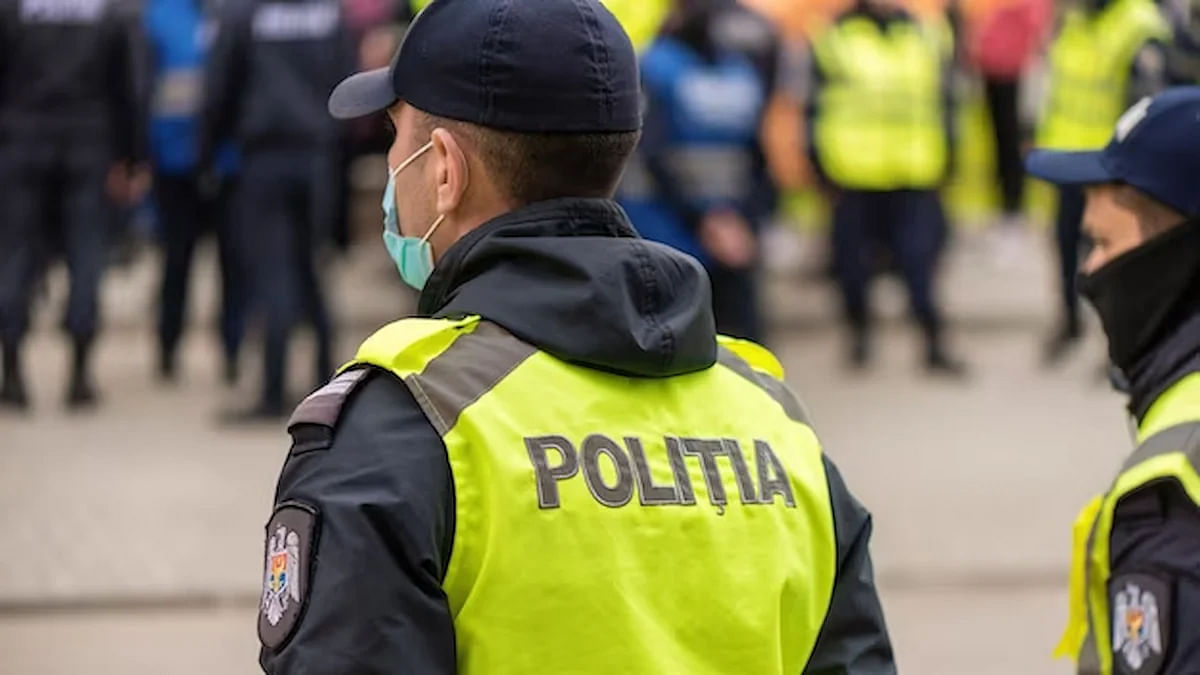

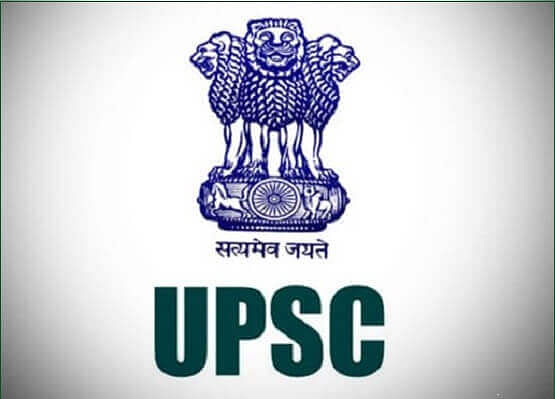
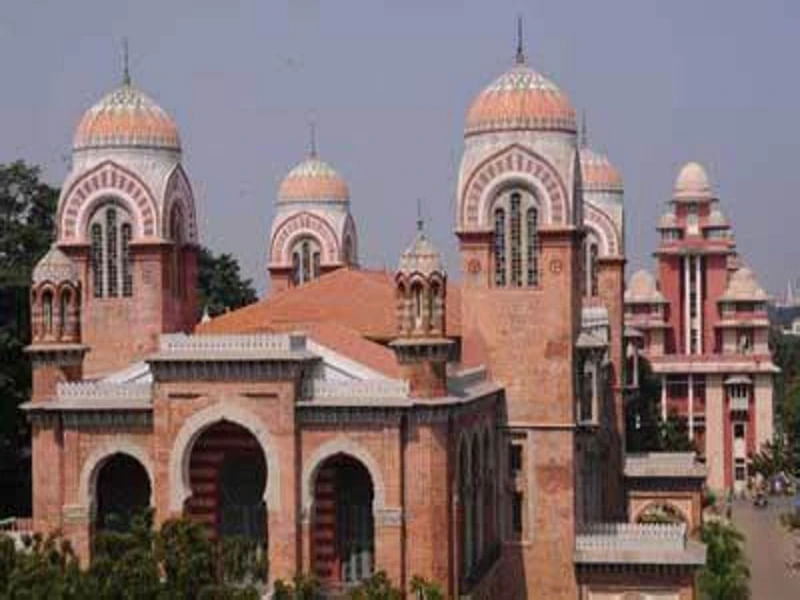

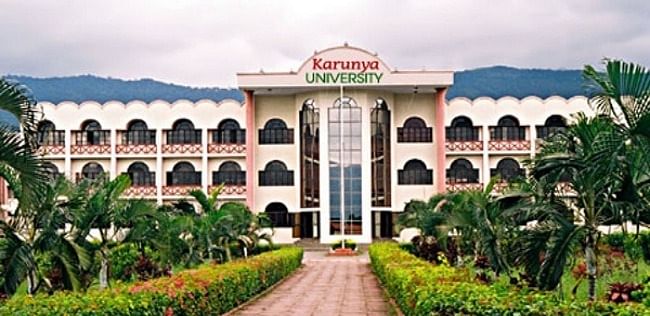

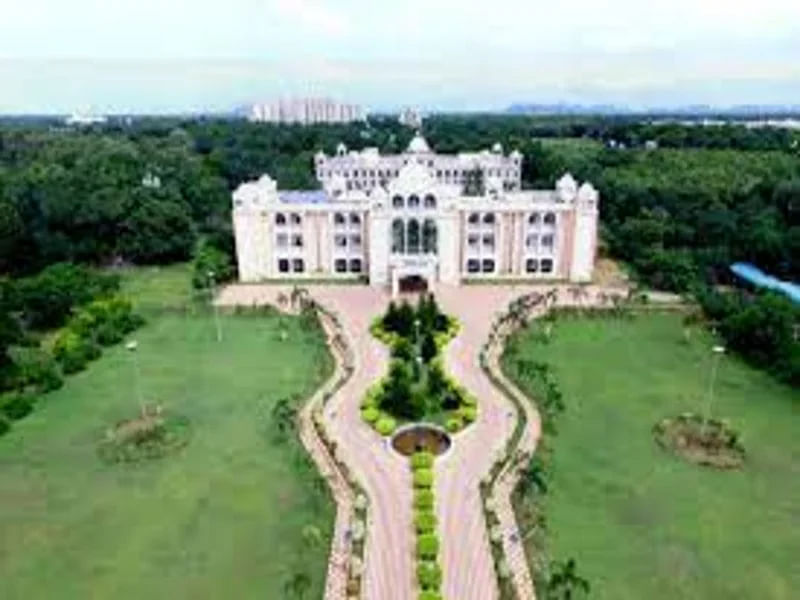

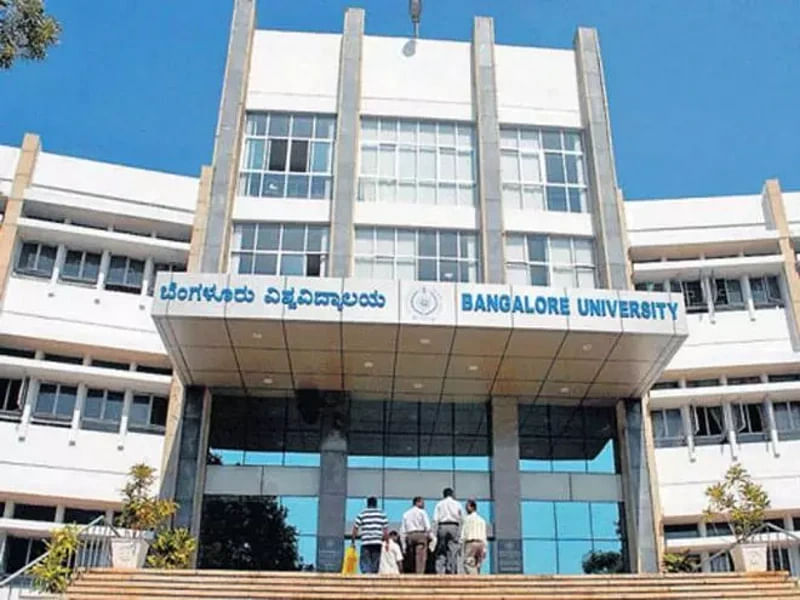





POST YOUR COMMENT